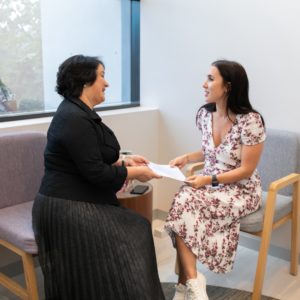Endometriosis is a very common condition in women. It occurs when cells that are similar to the ones that line the uterus, called Endometrium Tissue, grow in other parts of the body, such as the ovaries, fallopian tubes, bowel or bladder and other areas of the pelvis.
Endometrium Tissue breaks down when your hormones trigger monthly menstrual bleeding. Because the cells are not in the womb, they can’t flow out of the body as they do in a normal menstrual cycle. This causes the area to become inflamed and painful. The tissue builds up over time, intensifying both the condition and its associated pain.
While it can be treated, it can lead to fertility struggles. It can also be very emotionally and physically exhausting.
Who Does Endometriosis Affect?
Endometriosis affects about one in 10 women. It can be quite painful for them. However, some women experience no symptoms at all. If you have been trying unsuccessfully for some time to fall pregnant, it’s worthwhile having tests to confirm or rule out Endometriosis.
What Symptoms Should I Look For?
Endometriosis maybe a painful condition, so that will be your first sign. Many women experience cramping about two weeks before their period. Then, you are likely to feel strong, stabbing pain in your pelvic region once your period arrives. This pain is often quite prolonged. Your period will probably be extremely heavy, with a lot of dark blood at the beginning.
Other symptoms include pain during intercourse, lower back pain during your period and uncomfortable bowel movements or urination. Some will only experience mild forms of these symptoms while others will have very intense, strong pain.
The progressive nature of Endometriosis means that symptoms can become more intense with time. So, to begin with, there may be moderate symptoms in the early stages of the disease, with mild pain for up to two days before your period. However, as Endometriosis progresses, your symptoms will likely become more severe and last longer. They may even be present before or after your period.
What Causes Endometriosis?
There are several theories. One is known as ‘Retrograde Menstruation’. This is where menstrual blood that is meant to flow out through the cervix of the womb and vagina, actually flows backup the fallopian tubes and into the pelvic region.
A second theory is that it may be caused by ‘coelomic metaplasia’. This is where the cells lining the pelvic organs change structure and behave in a similar way to endometrial cells in the womb. This is thought to be triggered by puberty or oestrogen surges.
Another suggestion is that it is linked to immunity deficiencies, but we also see a lot of cases with a family history. So, if your mother or aunt has it, you might be up to seven times more likely to present with the condition too.
What Can You Do If You Are You Are Diagnosed With Endometriosis?
Endometriosis is a treatable condition and Dr. Raewyn can help you. Treatments can include medication or in some cases an operation, which has a good success rate.
Firstly, we use medications that relieve pain, combined with hormone-based treatments that reduce oestrogens. However, they work only as long as you continue to take them. So, the Endometriosis may recur once you stop taking these medications.
We know that the best way to both diagnose and treat Endometriosis is with a procedure called laparascopic surgery. This minimally invasive procedure involves viewing the abdominal cavity via a small incision in the navel. This way, we can confirm endometriosis, and treat it at the same time. Often this surgery is the only treatment required to increase your chances of conceiving naturally. It can also bolster the success rates of reproductive treatments like IVF, should you need to go down that path.
Conceiving With Endometriosis
In most cases, we advise that this is possible. We believe that Endometriosis hinders conception because the Endometrial cells release chemicals that impede a woman’s ability to conceive or affect an embryo’s development in the early stages. Endometriosis can also interrupt ovulation, as it distorts the fallopian tubes and ovaries. If scar tissue or cysts have developed, they may block the egg’s release, or affect the transportation of sperm.
On a happier note, while Endometriosis is a common cause of infertility, in most cases we can correct the condition to help you have a happy, healthy baby.



